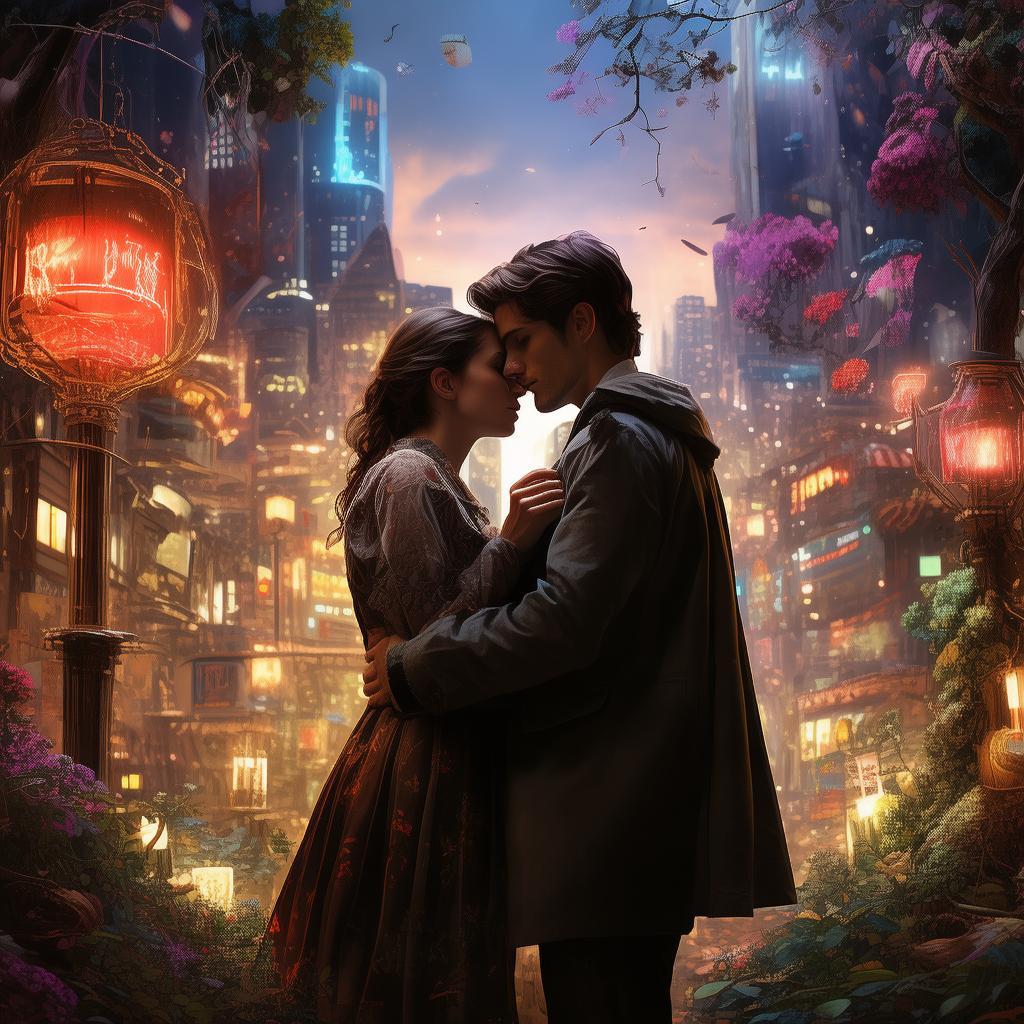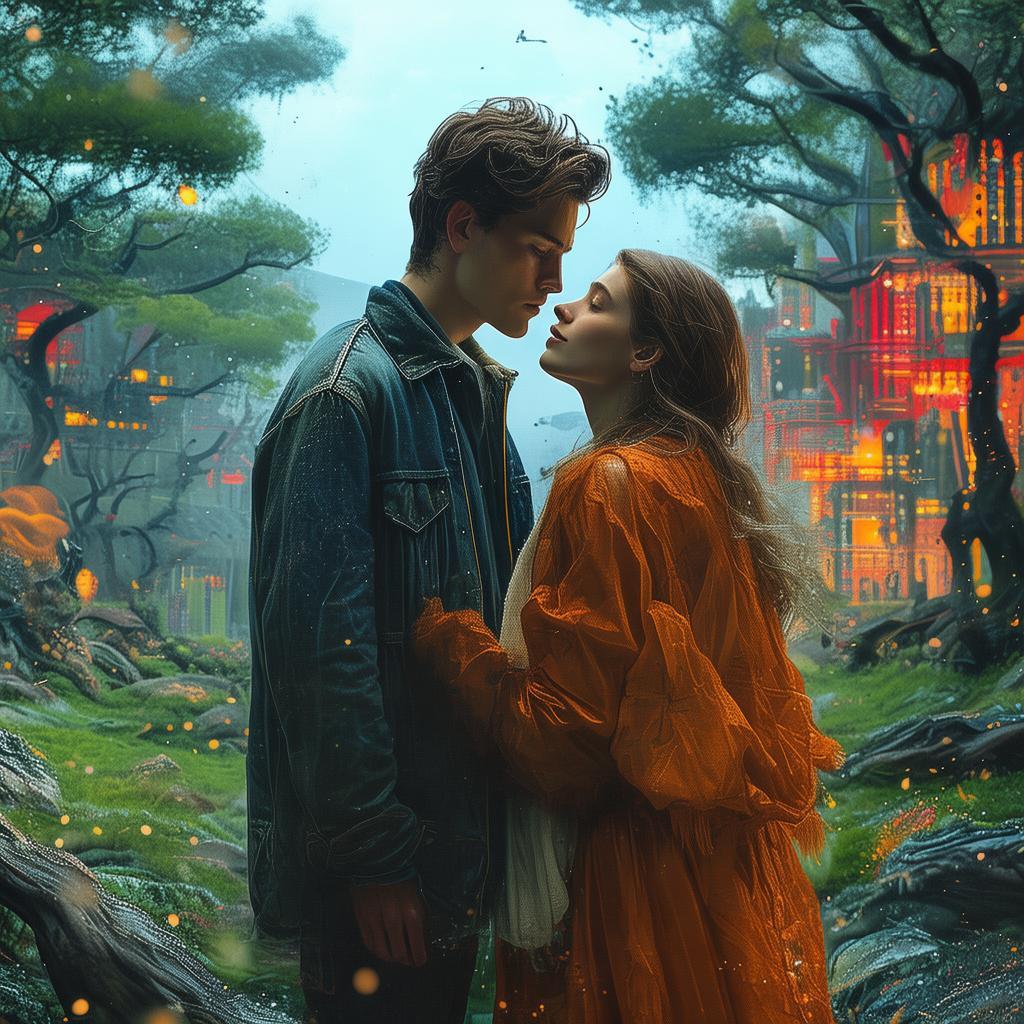Shadows of the Utopian State
In the year 2147, the world had been reshaped by the hands of the Supreme Council, a governing body that promised a utopian society of peace and prosperity. The city of Elysium was a shining beacon of this new world order, with towering skyscrapers, lush gardens, and a constant hum of happiness. Yet, beneath the surface, a hidden oppression thrived.
Amara, a young and idealistic artist, lived a life of contentment in Elysium. Her days were filled with painting and the company of her beloved husband, Kael. They had met in the vibrant markets of the city, where Amara sold her paintings and Kael, a former soldier, found solace in the art of a peaceful life. Their love was as vibrant as the city itself, a beacon of light in a world that seemed to have lost its colors.
One evening, as they walked through the serene gardens of Elysium, they stumbled upon a hidden alcove. It was a place that seemed to defy the very laws of their society—a place untouched by the oppressive uniformity. There, they found a young woman, Lila, her eyes filled with a haunting, desperate beauty.
Kael, with a heart full of questions, approached her. "Why are you here?" he asked, his voice barely above a whisper.
Lila's reply was chilling. "I'm here because I can't stay in this place any longer. They take everything from us. Our thoughts, our dreams, our lives."
The revelation hit Amara like a physical blow. She had never questioned the utopian facade of Elysium. How could her beloved city be so wrong? Yet, the more she listened to Lila's tale, the more she saw the truth in her eyes.
As days turned into weeks, Amara and Kael found themselves drawn deeper into the world of Lila's resistance. They discovered that the Supreme Council, far from being benevolent, was a regime that controlled every aspect of their lives. They were not just oppressing their citizens; they were erasing their identities, their very essence.
Amara's art, once a celebration of life, now became a medium for their cause. Her paintings depicted the beauty that was hidden from the eyes of the masses, the true face of Elysium. Kael, with his military training, became the protector of their group, ensuring that they remained safe from the ever-present threat of the Council's enforcers.
But love is a fragile thing, especially in a world where betrayal is a constant danger. As their struggle intensified, so did the Council's scrutiny. Amara and Kael's actions had attracted the attention of the most powerful figure in the regime, the enigmatic and cold-hearted Archon, who saw their rebellion as a personal affront.
The climax of their story came when the Archon revealed a chilling truth. Amara's parents had been key figures in the Supreme Council's rise to power, and their own lives had been sacrificed to ensure the utopian vision. Amara was the living embodiment of the Council's greatest achievement, and the Archon saw her as the ultimate prize.

Torn between her love for Kael and her loyalty to her parents' legacy, Amara made a choice that would change the course of her life. She chose to fight, to defy the Council, and to fight for the freedom of her fellow citizens.
In a dramatic and heart-wrenching twist, Amara discovered that Lila was not just a fellow fighter, but someone who had been assigned to spy on them. The revelation came as a shock, but it also solidified their resolve. They had to trust each other, to rely on their love and their shared goal to bring down the oppressive regime.
Their final confrontation with the Archon was a battle of wills, a clash between love and power. In the end, it was Amara's art that brought down the regime, her paintings revealing the truth to the citizens of Elysium. The Supreme Council fell, and with it, the illusion of utopia.
Amara and Kael, now a symbol of resistance, were hailed as heroes. But their love had paid a heavy price. Lila, having seen the truth of her mission, chose to join them, her heart now filled with a newfound purpose.
The story of Amara and Kael, once two lovers in a utopian society, had become a testament to the enduring power of love in the face of oppression. In a world that sought to erase their essence, they had found their voice, their identity, and their freedom.
✨ Original Statement ✨
All articles published on this website (including but not limited to text, images, videos, and other content) are original or authorized for reposting and are protected by relevant laws. Without the explicit written permission of this website, no individual or organization may copy, modify, repost, or use the content for commercial purposes.
If you need to quote or cooperate, please contact this site for authorization. We reserve the right to pursue legal responsibility for any unauthorized use.
Hereby declared.








